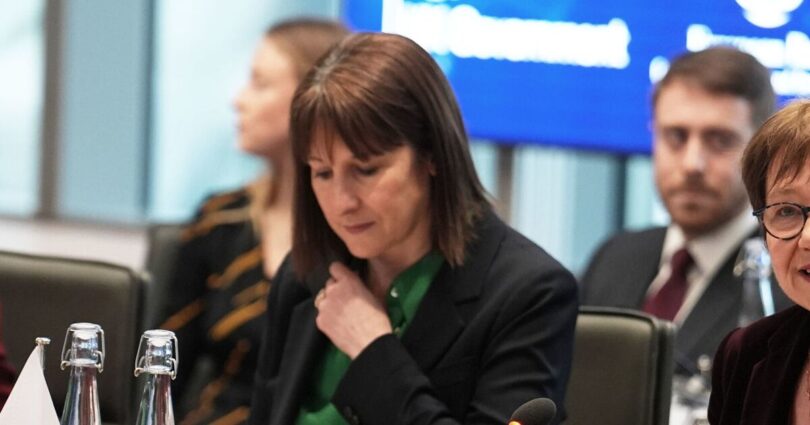Chancellor of the Exchequer Rachel Reeves (Image: PA)
Rachel Reeves is facing fresh misery as the unfolding car loan mis-selling scandal threatens to blow a £5.5bn hole in the public finances, piling further pressure on the Chancellor as she struggles to balance Britain’s books.
Treasury officials fear a wave of compensation payouts to drivers who were mis-sold car loans could permit major firms to legally slash their tax bills, depriving the Government of revenue.
Analysts at RBC Capital have estimated that as much as £5.5bn in corporation tax receipts could be lost to the Treasury as a result.
Such a shortfall would make Ms Reeves’ task of balancing the books even tougher. The Chancellor has so far refused to rule out tax rises or spending cuts in March, hamstrung as she is by weak economic growth and soaring borrowing costs, which have eaten away at her financial headroom.
The controversy deepened after the Supreme Court blocked Ms Reeves’s attempt to intervene in a high-stakes car finance case, which found that lenders had unlawfully paid commissions to dealers without customers’ knowledge.

Former Chancellor George Osborne (Image: Getty)
If the Court ultimately upholds the Court of Appeal’s previous ruling, it could trigger the largest wave of mis-selling payouts.
Under current tax rules, financial services firms, including insurers and asset managers, can treat compensation payments as deductible expenses for corporation tax purposes. This could result in a dramatic drop in tax receipts at a time when the Treasury can ill afford another fiscal shock.
Former Chancellor George Osborne moved to prevent high street banks from writing off their PPI-related payouts against their tax bills in 2015 in a bid to stem the collapse in corporation tax revenues. The PPI scandal eventually cost lenders an estimated £50bn.
The car finance market is much more complex, involving various institutions beyond traditional banks. While Mr Osborne’s restriction applied specifically to “banking companies,” which are typically defined as deposit-taking institutions, many high street lenders conduct their car finance businesses through subsidiaries which may not fall under the same rules.

Lloyds Bank is thought to be one of the lenders most at risk (Image: Getty)
Lloyds Bank, regarded as one of the most exposed institutions, runs its car finance operations through its Black Horse subsidiary. Other lenders range from major car manufacturers such as Volkswagen to smaller subprime finance firms, resulting in a legal grey area over how tax rules will apply.
Wayne Gibbard, of law firm Shoosmiths, told the Telegraph: “There is quite a significant difference in structure if you look across the market. They all have such different models and their route to market is different.
“Not everything is equivalent and frankly that’s why it’s taken so long to unpick because there isn’t just one model, there’s not just one commission, it’s not just one product. It’s quite a complex market.”
Treasury officials reportedly believe that bank-owned car finance firms will be unable to offset their compensation payouts, but this still leaves a major loophole for non-bank lenders, which are responsible for most of the seven million outstanding car loan agreements.

Rachel Reeves and Prime Minister Sir Keir Starmer (Image: Getty)
RBC estimates that if the Court of Appeal’s ruling is upheld, the car finance industry could face a total compensation bill of £33bn, leading to a £5.5bn loss in corporation tax revenue. Even if the ruling is overturned, the Treasury could still face a hit of up to £3bn.
The Treasury had argued before the Supreme Court that allowing tens of billions of pounds in compensation payments would damage Britain’s reputation as a business-friendly environment, warning of knock-on effects on economic growth.
However, it did not highlight the potential fiscal impact; instead, it emphasised concerns that a flood of claims could restrict access to car finance, particularly for low-income families.
Meanwhile, Lloyds Bank has increased its compensation provisions to over £1bn, warning that the potential payouts would be at “odds with 30 years of regulation.” The FTSE 100 bank has now set aside an additional £700m, on top of the £450m allocated last year, to cover the potential costs of compensation.

Rachel Reeves with Renaud-Basso, president of the European Bank for Reconstruction and Development (Image: PA)
Charlie Nunn, Lloyds’s chief executive, described the new provision as a “best estimate” based on multiple scenarios, including legal rulings and regulatory decisions.
The Court of Appeal ruled last year that banks had mis-sold car loans by paying “hidden” commissions to dealers. A final Supreme Court decision on the matter is expected in April, determining the scale of the financial fallout.
Lloyds had initially set aside £450m in response to an ongoing Financial Conduct Authority (FCA) investigation into discretionary commission arrangements, which have been under scrutiny for over a year. The FCA is waiting for the Supreme Court ruling before deciding on a potential redress scheme for affected borrowers.
Express.co.uk has approached the HMT Treasury for comment.
Source link








